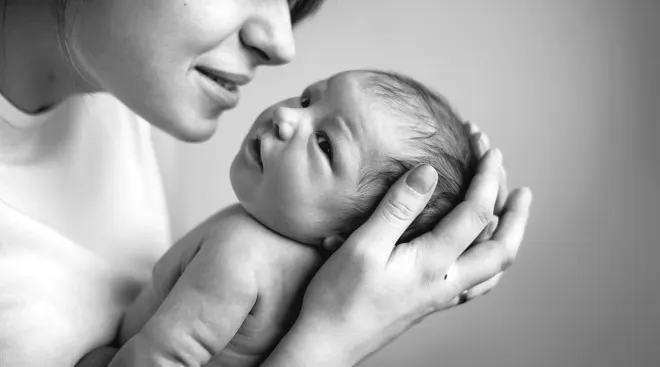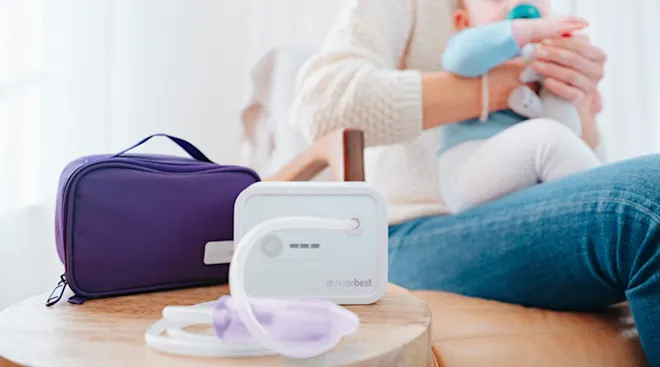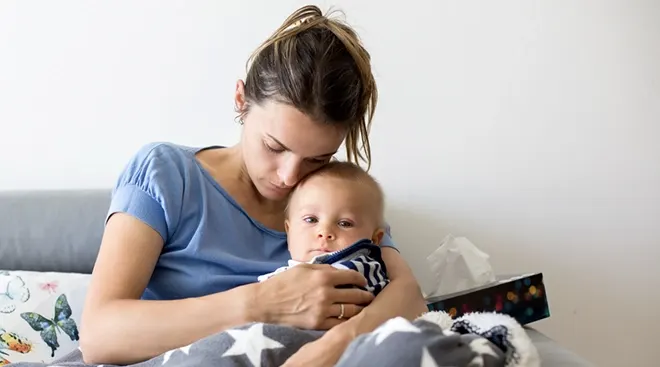What to Do About Newborn and Infant Tummy Cramps and Abdominal Pains
Not only do babies come into this world having to learn to walk, talk and pick up their favorite toys, but their bodies also have a special inside job: learning how to digest food efficiently. Sometimes, this new process can cause discomfort along the way. Abdominal cramps in infants can be common, but it may be hard to identify the issue since baby can’t just tell you what’s going on. Here, learn the clues that hint at tummy troubles—plus, what could be causing newborn and infant tummy cramps and how to help your little one get relief.
Spotting an infant with an upset tummy can be tricky. You can’t quite rely on verbal communication yet, and symptoms can also vary, depending on the cause, says Robert Quillin, MD, a board-certified pediatrician and medical director at Pediatrix in Texas. But don’t let that discourage you. There are other physical signals to watch out for that can indicate baby is uncomfortable. Some signs and symptoms of a baby stomach ache include:
- Fussiness
- Irritability
- Difficult to console
- Gurgling stomach
- Passing gas more than usual
- Acid reflux
- Vomiting
- Constipation
- Diarrhea
Unfortunately, sometimes locking down the culprit behind a baby stomach ache isn’t all that simple. There can be many reasons for newborn and infant tummy cramps. And you might not know for sure until you get a final diagnosis from a doctor.
Need a starting point to go off of? Below, some of the most common reasons why infants and newborns experience abdominal cramps, according to experts:
Gas
This is one of the most common culprits behind those pesky infant tummy cramps. At this early stage, baby’s digestive system is still developing—meaning, infants and newborns may struggle to break down milk or formula efficiently; this can lead to trapped gas. Excessive gas can also happen if baby swallows air when crying or feeding, per the American Academy of Pediatrics (AAP). With gas buildup, you’ll often notice signs like extra fussiness, a red face, grunting and baby pulling their legs towards their chest, according to [Children’s Hospital of Philadelphia](https://www.chop.edu/news/health-tip/how-help-newborn-gas.
Constipation
Just like gas, constipation can lead to abdominal cramps in newborns and infants, says Quillin. As baby’s little body is still adjusting to digesting milk or formula, their stools can become harder and less frequent, making it uncomfortable for them to move waste down and out. If this is the case, you might notice that baby is straining or turning red in the face. They may even have a bloated tummy. But keep in mind that the frequency and consistency of normal bowel movements can vary widely in babies and young children. As long as the stool is soft, though, and not hard pellets, often just helping baby out with some tummy massage or bicycle kicks can help.
Acid reflux
Acid reflux, also known as GER (gastroesophageal reflux), happens when baby’s stomach contents back up into their esophagus. And since our stomachs naturally contain acid-like substances, this can cause some discomfort. Per the AAP, if you suspect acid reflux in baby, you’ll usually notice them spitting up or vomiting after feedings. But here’s the reassuring news: Acid reflux is very common during baby’s first year, as their esophageal sphincter—the muscle that keeps food down—finishes developing. As this sphincter tightens and closes, acid reflux symptoms should naturally go away.
GERD
Like acid reflux, GERD (gastroesophageal reflux disease) also happens when stomach acid flows back up the esophagus. Babies with GERD may experience more intense and longer-lasting symptoms than those babies who are “happy spitters” and just spit up, the AAP notes. Along with spitting up after feedings, a baby with GERD might also struggle to gain weight, have trouble feeding, be in pain when feeding or lying down, cough or wheeze or have blood in their spit-up.
Milk or soy allergy
A milk or soy allergy can also cause abdominal cramps in babies, says Ashish Patel, MD, a physician in chief and division chief of gastroenterology for Phoenix Children’s. When this happens, contents in the milk or soy disrupt or inflame the digestive tract. Symptoms like excessive crying, vomiting, skin rashes, gagging, refusing food, failure to gain weight, or bloody stool could point to an allergy. There’s something else you should know, too—about 30 percent of babies who are allergic to cow’s milk protein are also allergic to soy protein, per Boston Children’s Hospital. You might need to remove both from baby’s diet if you aren’t seeing any tummy relief, but always check in with your pediatrician before making formula changes or dietary swaps.
“As we assess and rule out these common causes, there can be rarer causes related to anatomical or congenital issues that must be evaluated promptly by your pediatrician,” says Patel. These might include pyloric stenosis, intussusception, gastrointestinal infections and other more serious conditions.
Treatment will depend on the type of tummy trouble baby is experiencing. “Assuming there are no overt signs of illness, such as fever, lethargy, vomiting or diarrhea, there are a few things that parents might try to alleviate these tummy troubles,” says Quillin. Below is a list of suggestions and remedies you can try at home:
- Baby massage: Baby massage is a great tool to help babies pass trapped gas, says Patel. By physically moving the air in their stomach around, it can help the gas escape. Children’s Hospitals and Clinics of Minnesota suggests using flat hands to massage baby’s belly in a clockwise motion while applying light to medium pressure. Try this movement one to three times in a row, at least once a day.
- Exercise: Getting babies to move their bodies can be tricky when they’re young. But movement can majorly help stomach issues like gas and constipation. Quillin suggests trying gentle, passive exercises like bicycling baby’s legs, one by one or extending and scrunching their legs together in a cohesive movement.
- Feeding adaptations: Reducing the volume of feeds by feeding baby more frequently in fewer amounts is also an option, Quillin notes. This gives baby a chance to digest their food little by little instead of in one fell swoop—essentially giving their digestive system a break. Also, try keeping baby in an upright position immediately after they eat, for about 30 minutes, Patel adds. In cases of reflux, this can help reduce the amount of stomach acid that might try to travel back up the esophagus.
- Nutrition: If baby is 6 months or older and developmentally ready, you can start providing different nutrition sources (like solids) to help with tummy issues. Quillin suggests giving fruits, prune juice and water to help pass stuck stool. Your pediatrician might also recommend a prebiotic or probiotic for additional digestive support. Most importantly, understanding what foods are irritating baby’s belly is also critical. “Make sure you keep a diary of feedings and relationship to symptoms so you can discuss with your doctor,” recommends Patel.
- Medication: Lastly, don’t forget that talking about different types of medications with your pediatrician is also an option. If baby is struggling with severe gas or constipation, your doctor might suggest things like adding simethicone drops to baby’s feedings or even using suppositories to get stool moving along.
When it comes to newborn and infant tummy cramps, keep a close eye on the symptoms. You’ll want to contact your pediatrician if you notice a fever, lethargy, persistent or projectile vomiting, excessive diarrhea, blood in their stool or a tight stomach that’s tender to the touch, says Quillin. Poor weight gain is also a sign to get a professional opinion.
Frequently Asked Questions
How do you know if your newborn has tummy cramps?
Your newborn may have tummy cramps or a stomach ache if they show signs of fussiness, irritability, passing gas more than usual, or if they’re experiencing acid reflux, vomiting, constipation or diarrhea.
What does a newborn gurgling tummy mean?
If a newborn’s stomach is gurgling, it can mean many things. There isn’t necessarily something wrong. “It may just mean the infant is hungry or preparing to pass stool,” says Quillin. Another culprit? Baby could be swallowing excess air during their feedings, notes Patel. In some cases it may also signify baby has a milk or soy intolerance or allergy, Patel adds.
Please note: The Bump and the materials and information it contains are not intended to, and do not constitute, medical or other health advice or diagnosis and should not be used as such. You should always consult with a qualified physician or health professional about your specific circumstances.
Robert Quillin, MD, is a board-certified pediatrician and medical director at Pediatrix in Texas. He earned his medical degree from and completed his residency at the University of Texas Medical Branch in Galveston, Texas.
Ashish Patel, MD, is a physician in chief and division chief of gastroenterology for Phoenix Children’s. He received his medical degree from and completed his residency at Texas A&M Health Sciences Center in Bryan, Texas.
Healthy Children (American Academy of Pediatrics), Abdominal Pain in Infants: 8 Possible Reasons Your Baby’s Tummy Hurts, May 2023
Children’s Hospital of Philadelphia, How to Help a Newborn with Gas, September 2024
Nationwide Children’s Hospital, Constipation in Infants, 2022
Healthy Children (American Academy of Pediatrics), Gastroesophageal Reflux & Gastroesophageal Reflux Disease: Parent FAQs, June 2019
UW Health, Allergy: Milk and Soy Elimination Diet, July 2023
Boston Children’s Hospital, What is allergic colitis?
Children's Hospitals and Clinics of Minnesota, Abdominal Massage, May 2015
Learn how we ensure the accuracy of our content through our editorial and medical review process.
Navigate forward to interact with the calendar and select a date. Press the question mark key to get the keyboard shortcuts for changing dates.
Advertisement
Advertisement
Advertisement
Advertisement





















































